Starting an online store is exciting, but choosing the right eCommerce platform can be difficult.
There are dozens of options in the market, and each one says it is the best eCommerce website builder.
But the truth is: Your choice directly affects your sales, brand identity, website performance, SEO, and how fast your business can scale.
We work with clients across all business sizes, startups, retail brands, wholesalers, and D2C stores.
We’ve seen how the right platform can lead to better conversion rates, while the wrong one leads to slow loading speeds, lost orders, and high maintenance costs.
Popular platforms like Shopify, WooCommerce, Wix, BigCommerce, and Squarespace are widely used, but each one works differently.
Here you will learn about the best eCommerce website builders & use them for your store.
What Makes an eCommerce Website Builder “The Best”?
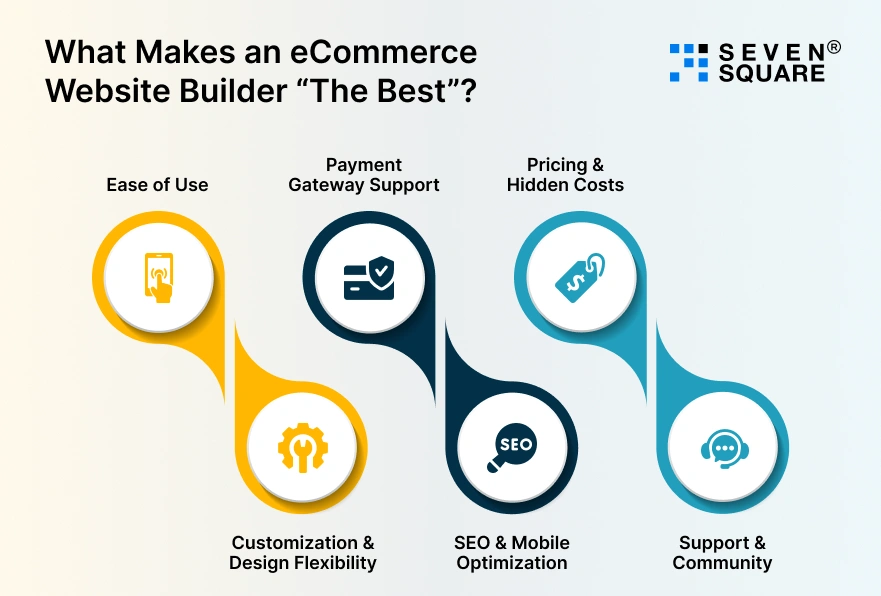
The right choice depends on your business goals, technical comfort, and budget. Here are the key factors we recommend evaluating:
1. Ease of Use
- If you’re new to online selling, look for an easy eCommerce website builder for beginners that is easy to set up with no coding needed.
2. Customization & Design Flexibility
- Your store design must match your brand. Some builders give drag-and-drop tools, while others allow full customization through plugins or code.
3. Payment Gateway Support
- Make sure the platform supports Razorpay, Stripe, PayPal, UPI, and Cash on Delivery smoothly.
4. SEO & Mobile Optimization
- Your online store must load fast, work on mobile, and allow SEO settings like meta-titles, descriptions, and structured data.
5. Pricing & Hidden Costs
- Some platforms look affordable at first but include themes, plugins, hosting, & transaction fees. Also, compare long-term costs.
6. Support & Community
- A strong support team and active developer community ensure your store stays secure and scalable.
If your goal is to grow and scale, then choose the best platform to build an online store.
Shopify: The All-Rounder for Beginners & Growing Stores

When someone asks us which platform is the easiest to launch quickly and scale later, our honest answer is usually Shopify.
It is often seen as the #1 choice because it provides everything in one place: Hosting, security, payment gateways, inventory management, and beautiful store themes.
This makes Shopify perfect for:
- Clothing & fashion brands.
- Dropshipping businesses.
- Small and medium-sized online stores.
Shopify also supports multi-channel selling, meaning you can sell on Instagram, Facebook, WhatsApp, Amazon, and your website from one dashboard.
Plus, Shopify is an eCommerce builder with a free trial, so you can try it before committing.
Pros:
- Beginner-friendly setup (no coding needed).
- Many modern, professional store themes.
- Secure hosting & fast performance.
- Excellent multi-channel selling features.
- 24/7 customer support.
Cons:
- Monthly subscription fees.
- Extra transaction fees if not using Shopify Payments.
- Customizations sometimes require paid apps.
WooCommerce: Best If You Want Full Control & Customization
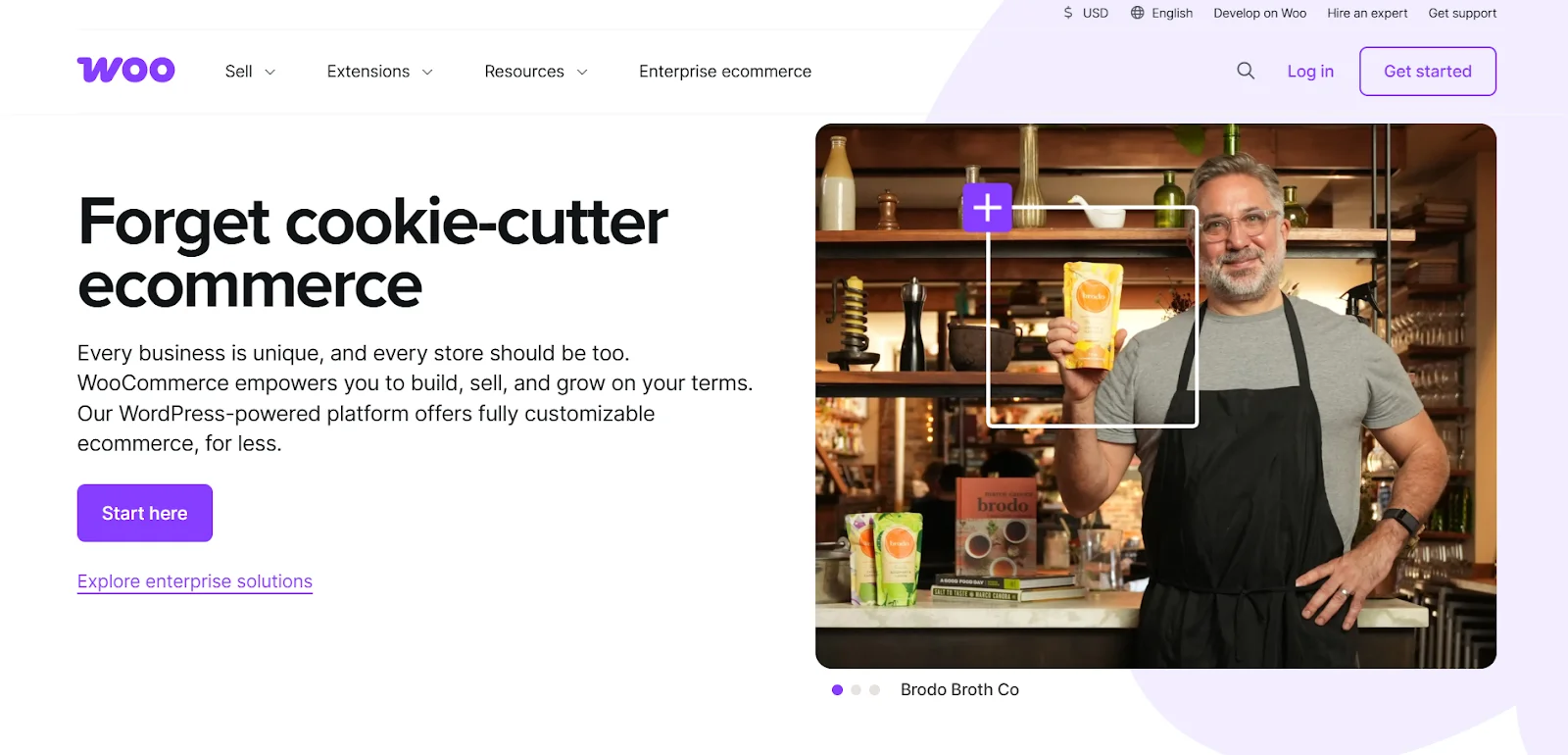
If your business needs full control over design, features, and hosting, then WooCommerce is likely your best match.
It is an open-source platform built on WordPress, which makes it incredibly flexible and customizable.
This platform is often the cheapest eCommerce website builder, because the core plugin is free; you only pay for hosting, premium themes, or optional extensions.
It’s ideal for:
- Businesses are already using WordPress.
- Stores need advanced product features.
- Those who want to build an eCommerce website without coding can use plugins.
Pros:
- Full customization control (design, features, hosting).
- No monthly platform fee (plugin is free).
- A large library of plugins for added features.
- Good for SEO (WordPress advantage).
Cons:
- Setup can be confusing for beginners.
- Requires hosting management & maintenance.
- Too many plugins can slow performance.
Wix eCommerce: The Easiest Drag-and-Drop Online Store Builder
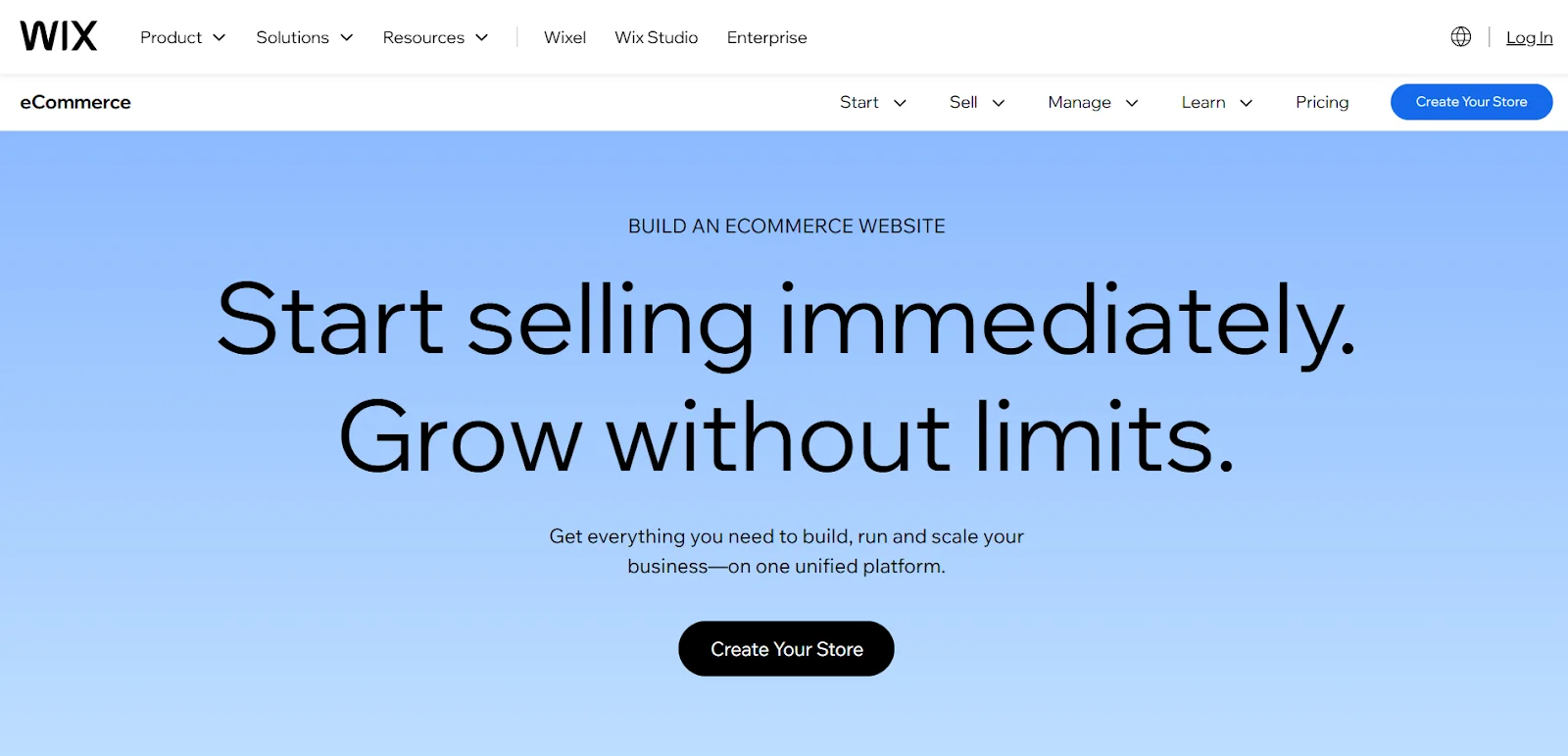
If you’re wondering, “Which eCommerce website builder is best for beginners?” then Wix eCommerce might be the answer.
It is a simple drag-and-drop builder, meaning you can design pages visually without touching code.
Wix works best for:
- Small product catalogs.
- Boutique stores.
- Personal brands and startups are testing initial ideas.
Pros:
- Very easy to use, perfect for beginners.
- Affordable pricing plans.
- 100s of modern drag-and-drop templates.
- Built-in marketing tools.
Cons:
- Not ideal for large or complex stores.
- Limited scaling capabilities compared to Shopify/BigCommerce.
BigCommerce: Built for Growing & Enterprise Online Stores
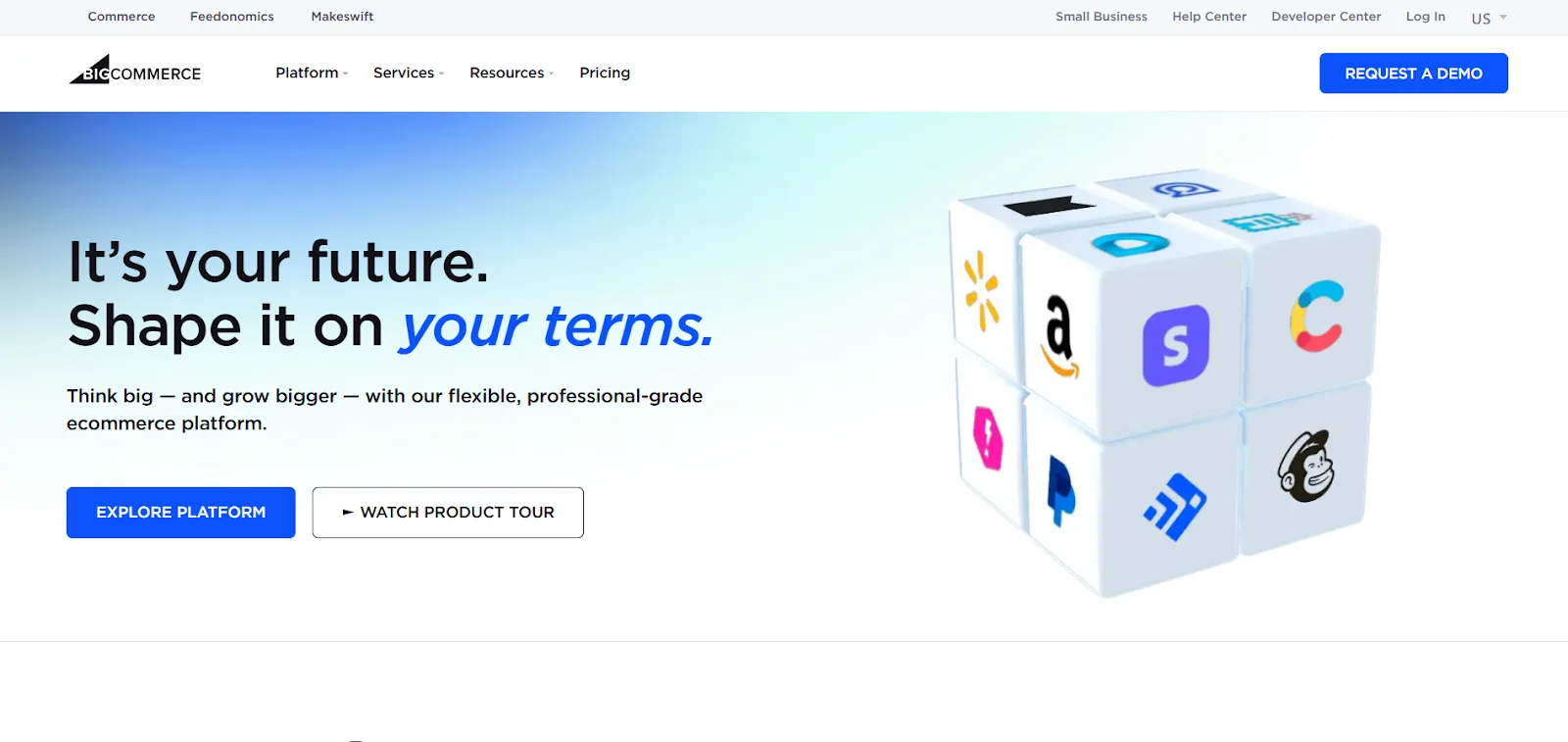
If you are planning to scale into a large retail or wholesale store, then BigCommerce is a strong choice.
Unlike beginner-focused builders, BigCommerce has built-in features for advanced inventory management, multi-store management, and enterprise performance.
This platform is great for:
- Established brands
- Wholesalers
- High-volume eCommerce stores
Pros:
- Powerful inventory and product catalog capabilities.
- No extra transaction fees.
- Built-in SEO & performance optimization.
- Great for scaling internationally.
Cons:
- Slight learning curve.
- It can feel overwhelming for first-time store owners.
Squarespace Commerce: Best for Creatives & Brand-Focused Stores

If your online store needs to look visually premium, Squarespace Commerce is the top pick.
It offers the best templates for fashion stores, jewelry brands, portfolio-based businesses, photography stores, and lifestyle brands.
Pros:
- Stunning, elegant website templates.
- Smooth and clean design editing experience.
- Strong branding + store + content integration.
- Great for artists, boutiques, and lifestyle labels.
Cons:
- Limited product catalog scalability.
- Not ideal for very advanced eCommerce features.
Learn more about Top ChatGPT Plugins to Boost Productivity.
Comparison of Top eCommerce Website Builders
Here, we have tried to compare some of the best eCommerce website builders on the basis of various factors.
| Platform | Best For | Ease of Use | Cost | Unique Strength | Limitations |
|---|---|---|---|---|---|
| Shopify | Beginners + Brands | Very Easy | Paid | All-in-One System | Monthly + Transaction Fees |
| WooCommerce | Developers + DIY Businesses | Moderate | Free Plugin | Full Control & Customization | Requires Hosting & Plugins |
| Wix eCommerce | Beginners | Easy | Affordable | Simple Drag & Drop Builder | Limited Scaling for Large Stores |
| BigCommerce | Scaling Retail Stores | Moderate | Paid | Built-in Enterprise Features | Slight Learning Curve |
| Squarespace Commerce | Creative & Visual Brands | Easy | Paid | Beautiful Templates | Not ideal for complex product catalogs |
Which eCommerce Website Builder Should You Choose?
Still haven’t figured out which eCommerce website builder you should use? Then here we simplified it.
| If You Want… | Choose |
|---|---|
| The Easiest Setup | Wix or Shopify |
| Maximum Customization & Control | WooCommerce |
| To Scale a Large Retail / Wholesale Store | BigCommerce |
| Visual & Aesthetic Branding with Stunning Designs | Squarespace |
We help businesses evaluate platforms based on their industry, growth goals, and operational needs, so they choose the one that supports them long-term.
How Can We Create an eCommerce Store for Your Business?
We build high-performance eCommerce experiences that attract customers, improve conversions, and boost profits.
- We compare platforms for you, a complete eCommerce website builder comparison, based on business type, features, and budget.
- For beginners, we use an easy eCommerce website builder for a beginner’s setup, so you can manage your store without technical skills.
- We help you set up your online store to sell on Instagram, Facebook, WhatsApp, Amazon, and Google Shopping from one dashboard.
Want a Custom eCommerce Store? Contact Us Now!
What Are the Features You Shouldn’t Ignore While Choosing a Platform?
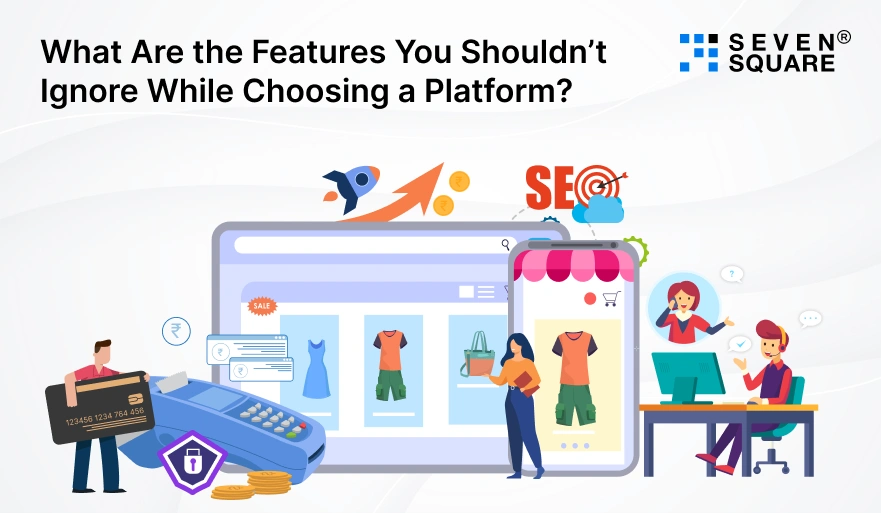
When we do an eCommerce website builder comparison for our clients, these features are always non-negotiable:
- Mobile Responsiveness (Most customers shop on phones).
- SEO Control (Meta tags, page speed, schema support, blog tools).
- Payment Gateway Compatibility (UPI, PayPal, Stripe, Razorpay).
- Reliable Customer Support (24/7 technical and billing help).
- Multi-Channel Selling (Instagram, Facebook, Pinterest, Amazon integration).
If the platform lacks any of these, it may hurt your business growth later.
FAQs
- Yes, platforms like Shopify, Wix, and Squarespace offer no-code eCommerce setup with drag-and-drop tools.
- Shopify or Wix are the most beginner-friendly, requiring no technical skills.
- Shopify works best because of its strong dropshipping app ecosystem, but WooCommerce also works well with plugins.
- WooCommerce can be the cheapest if you’re okay with managing hosting and plugins, while Wix is affordable for small stores.